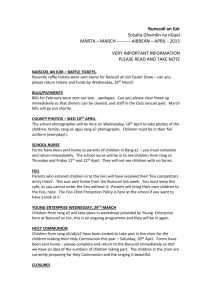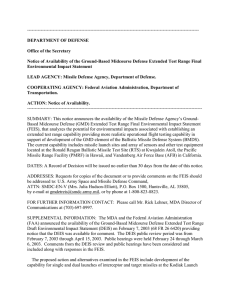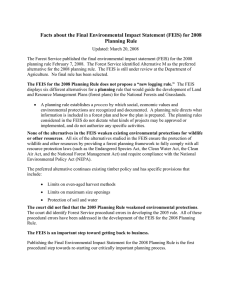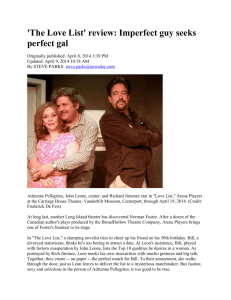FINDING OF NO PRACTICABLE ALTERNATIVE EVOLOVED EXPENDABLE LAUNCH VEHICLE PROGRAM
advertisement
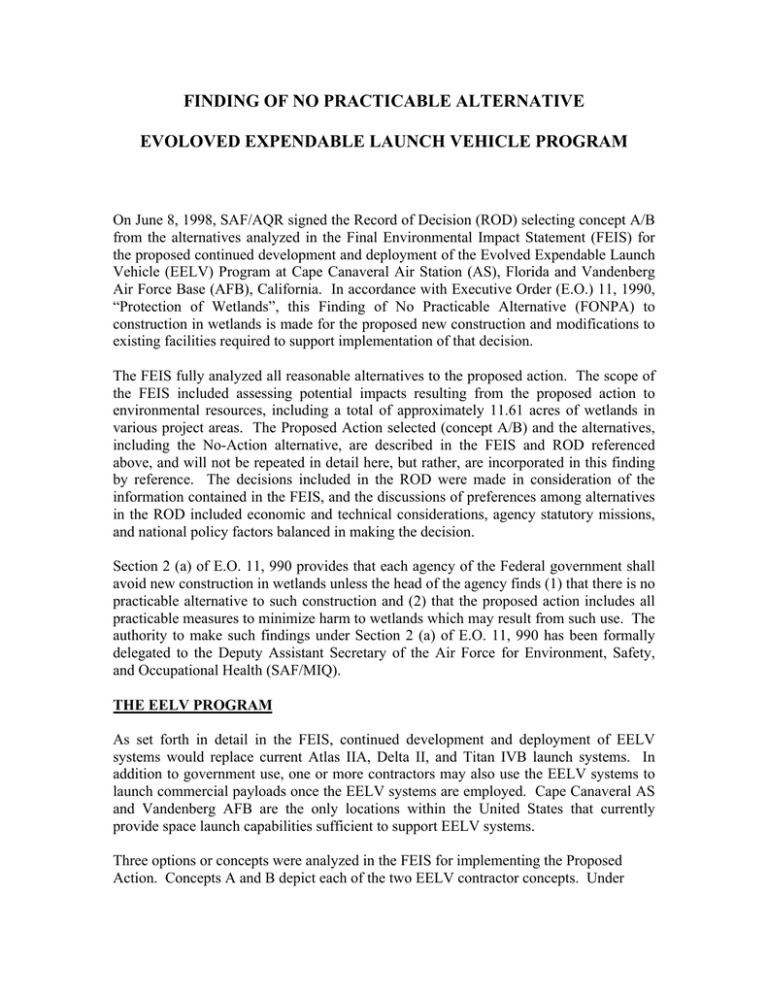
FINDING OF NO PRACTICABLE ALTERNATIVE EVOLOVED EXPENDABLE LAUNCH VEHICLE PROGRAM On June 8, 1998, SAF/AQR signed the Record of Decision (ROD) selecting concept A/B from the alternatives analyzed in the Final Environmental Impact Statement (FEIS) for the proposed continued development and deployment of the Evolved Expendable Launch Vehicle (EELV) Program at Cape Canaveral Air Station (AS), Florida and Vandenberg Air Force Base (AFB), California. In accordance with Executive Order (E.O.) 11, 1990, “Protection of Wetlands”, this Finding of No Practicable Alternative (FONPA) to construction in wetlands is made for the proposed new construction and modifications to existing facilities required to support implementation of that decision. The FEIS fully analyzed all reasonable alternatives to the proposed action. The scope of the FEIS included assessing potential impacts resulting from the proposed action to environmental resources, including a total of approximately 11.61 acres of wetlands in various project areas. The Proposed Action selected (concept A/B) and the alternatives, including the No-Action alternative, are described in the FEIS and ROD referenced above, and will not be repeated in detail here, but rather, are incorporated in this finding by reference. The decisions included in the ROD were made in consideration of the information contained in the FEIS, and the discussions of preferences among alternatives in the ROD included economic and technical considerations, agency statutory missions, and national policy factors balanced in making the decision. Section 2 (a) of E.O. 11, 990 provides that each agency of the Federal government shall avoid new construction in wetlands unless the head of the agency finds (1) that there is no practicable alternative to such construction and (2) that the proposed action includes all practicable measures to minimize harm to wetlands which may result from such use. The authority to make such findings under Section 2 (a) of E.O. 11, 990 has been formally delegated to the Deputy Assistant Secretary of the Air Force for Environment, Safety, and Occupational Health (SAF/MIQ). THE EELV PROGRAM As set forth in detail in the FEIS, continued development and deployment of EELV systems would replace current Atlas IIA, Delta II, and Titan IVB launch systems. In addition to government use, one or more contractors may also use the EELV systems to launch commercial payloads once the EELV systems are employed. Cape Canaveral AS and Vandenberg AFB are the only locations within the United States that currently provide space launch capabilities sufficient to support EELV systems. Three options or concepts were analyzed in the FEIS for implementing the Proposed Action. Concepts A and B depict each of the two EELV contractor concepts. Under either concept only one of the two contractors would continue to develop and use the EELV systems. The third option, Concept A/B, depicts a scenario under which both Contractors would continue with the development and use of the EELV systems. CONCEPT A/B-THE PROPOSED ACTION Under Concept A/B, all of the facilities used for Concept A and Concept B activities would be utilized, and construction activities required for Concept A and Concept B would also occur under Concept A/B. As described in the FEIS, the construction in wetlands required for Concept A/B is the same as would have been required for Concepts A and B. ALTERNATIVES Available infrastructure effectively limited the practicable alternatives to existing space launch complexes and support facilities at Cape Canaveral AS, FL, and Vandenberg AFB, CA. Use of existing developed sites for EELV facilities had the additional benefit of providing the greatest potential for mitigation of wetland impact through avoidance. CONCLUSION Based on the above information, including the analysis contained in the FEIS and reflected in the ROD and taking into account the economic, environmental and other pertinent factors analyzed in the FEIS, I find there are no practicable alternatives to construction in wetlands for the Proposed Action (Concept A/B). I further find that all practicable measures have been taken to minimize harm to wetlands from activities associated with the Proposed Action. 10 Jun 1998 THOMAS W.L. McCALL, Jr. Deputy Assistant Secretary of the Air Force (Environmental, Safety and Occupational Health)
